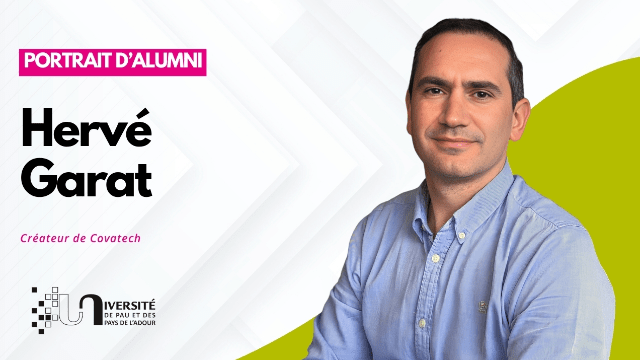Hervé Garat, 40, founder of Covatech
“I found my first engineering job before the end of my course.”
With a real passion for electronics and embedded software, Hervé Garat found his niche at the GEII IUP (Electrical engineering and industrial IT), then in the Master’s 1 and 2 in Industrial systems engineering. He has nothing but fond memories of his studies at the UPPA campus in Pau.
Can you tell us about your studies?
I've always been interested in electronics, and I wanted to work in this sector. I arrived at the University of Pau with a vocational diploma in electronic engineering and a technological Baccalaureate. I enrolled in a two-year university course in mathematics and at the end of the first year I entered the GEII IUP (University institute for professional studies in electrical engineering and industrial IT). I never thought I would continue studying after my Bachelor’s degree, but the GEII IUP was offering an engineering degree recognised in sectors such as metalworking and that made it possible to apply for management positions. And then in 2005, the UPPA opened a Master’s in Industrial systems engineering, which made me want to go even further, and being able to continue my studies in the region was decisive. The Master’s degrees on offer in Paris and Bordeaux had nothing on the one in Pau. I don’t regret my choice of “staying local” with its offer of small classes, real attention from teaching fellows for each student, a course focused on the professional side of things, and several internships. And Pau is an ideal place to study, nestled between the ocean and the mountains.
Tell us about the beginning of your career.
I did three internships during my curriculum which helped me refine my choices. The first was during my Bachelor’s in an electrical design office, where I worked as a technician. The second was with a company in Bidart, which made weather stations for motorways, airports, ski resorts, etc. It included programming, electronics, everything I enjoy. Then, at the end of my course, I spent six months in an IoT company where I worked on access sharing. As I built up experience working with these companies, it was reassuring to realise that the theory I'd learned at the UPPA was a true reflection of what actually happens in practice, and I was able to get along fine as part of a team. The scientific approach taught at the university gave me a method that works well! In fact, I found my first job before I’d even finished my final year internship.
When did you start thinking about creating your own company?
It was something I’d wanted to do since university. But it takes courage, and one day you have to stop looking for the ideal product that’s going to bring great added value! After my studies, I had the chance to move forward with a really great company called WorldCast Systems in Bordeaux, working as a development engineer than as an electronic and embedded software project manager. I stayed there for 13 years. When the design office decided to call on external partners, I seized the opportunity to become an external partner myself, and that's when I created Covatech, an industrial design office specialised in electronic, mechanical, and embedded software development, and in project management. Our expertise covers technical and scientific subjects such as electronics, analogue/digital technologies, thermal engineering, mechanics, metrology, algorithms, and real-time embedded software. Covatech was founded in 2021 in Bordeaux, and my former employer was my first client.
What words do you spontaneously associate with the UPPA?
Competencies, method, professional development.
What advice would you give to a future student?
I would tell them to give priority to studying locally. Staying in your region, for the first few years at least, increases your chances of success. We need to break down the stereotypes that lead people to think that small-town universities are not as good as those in big cities.
→Want to find out more about Covatech?

Comments0
Please log in to see or add a comment
Suggested Articles



